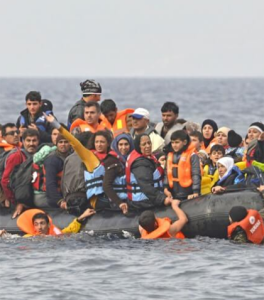Migrant deaths at sea soaring
More than 3,000 refugees, asylum seekers and migrants died or went missing during 2021 while trying to reach European countries on voyages via the Mediterranean and Atlantic sea routes, new data reveals.
The shocking figures are revealed in a new report published by the UN’s refugee agency UNHCR and amounts to the highest increase in migrant deaths at seas in recent years.
 The report says that thousands of people from Africa are taking dangerous routes to Europe each year, mainly travelling over the Sahara Desert and leaving from North Africa on small boats.
The report says that thousands of people from Africa are taking dangerous routes to Europe each year, mainly travelling over the Sahara Desert and leaving from North Africa on small boats.
EU authorities are, meanwhile, trying to find new ways of dealing with the influx of migrants who attempt to reach European countries through so called ‘irregular’ ways.
According to the UNHCR report, a total of 3,077 people were reported dead or missing, amounting to a doubling of deaths compared to 2020 figures.
UNHCR spokesperson Shabia Mantoo said: “We are seeing increases soar. It’s alarming”.
UHHCR started to publish full death and missing tolls in 2019. And this year already, a total of 553 people have been reported dead or missing, the majority of them are on the Central Mediterranean route.
The figures do not include the number of persons lost along land routes, such as through the Sahara, or those lost in smuggler-run detention centres where survivors have reported sexual violence and forced marriage and labour.
UNHCR says the majority of the persons dead or missing come from: Tunisia; Morocco; Mali; Guinea, and; Eritrea.
Others are from Egypt, Ivory Coast, Senegal, Syria, Iran, and Afghanistan.
“We have been urging that there needs to be humanitarian and development action that needs to be strengthened to address these drivers that force people to move in the first place,” Ms Mantoo said in statement.
She also expressed concerns about pushbacks after the release of a report by the UN rights office which partly blamed the EU for deaths in the Mediterranean on unanswered calls for help.
Most of the sea crossings took place in packed, unseaworthy, inflatable boats – many of which capsized or were deflated leading to the loss of life, UNHCR said.
The sea journey from West African coastal states such as Senegal and Mauritania to the Canary Islands is long and perilous and can take up to 10 days. Many boats drifted off course or otherwise went missing without trace in these waters.
UNHCR is appealing for support to help provide meaningful alternatives to these dangerous journeys and prevent people from becoming victims of traffickers. The approach calls for increased humanitarian assistance, support and solutions for people in need of international protection and survivors of gross human rights abuses.
The appeal covers some 25 countries across four different regions connected by the same land and sea routes which are used by migrants, asylum seekers and refugees. They include countries of origin, departure, first asylum, transit, and countries of destinations.
See the UNHCR report here: https://reporting.unhcr.org/document/2247












